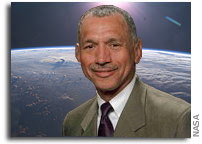Remarks for Adminstrator Bolden – National Academy of Sciences Aeronautics and Technology Rountable

Aug. 25, 2011
Thank you. It’s a pleasure to be here. I’m delighted that the Aeronautics and Space Engineering Board has been able to form this roundtable to examine what is certainly one of NASA’s priority activities – aeronautics research and its future.
Our space missions may sometimes be more high profile, but NASA’s aeronautics work is possibly the place where our work is most seen and felt by the general public on a daily basis, even when they’re not aware of it.
Like all things we do, our future-centric approach is all about creating new capabilities for future generations, pushing the envelope of technology and making life better here on Earth.
Historically, we’ve done pretty well in aeronautics. There’s NASA- derived technology in some part of virtually every aircraft flying today. Our leaps in space and in the sky have complemented each other and we look forward to more synergy in the future.
It’s very important that we help bring about the next generation of aircraft and air traffic control systems. Aviation is a huge sector of the economy, not only in terms of jobs, but also in transporting goods and people. It consistently contributes in a positive way to the nation’s balance of trade and is a symbol of our technical capability. In 2010, aerospace manufacturing provided a U.S. trade surplus of $43.6 billion. In this time of continuing economic challenges, the aeronautics industry provides the kinds of jobs that Americans are proud to have — a report from 2009 identified nearly one million air transportation and domestic manufacturing jobs and this is integral to our entire way of life.
Certainly we are fortunate to have the high speed, safe and reliable air transportation system of today, but what we need are systems that can improve that safety, accommodate the growing number of passengers, and be more friendly to the environment.
This roundtable’s work is very timely. Aviation and the aeronautics industry are facing real challenges as we look toward the future.
As our system becomes more complex and increasingly automated, our goals are to improve capability and safety — both here in the
U.S. and globally — reduce fuel consumption and be friendlier to the environment in ways such as noise reduction. The aeronautics community’s perspectives will be essential in shaping NASA’s role in that work. Your input will be valuable as we assess national needs and opportunities and answer questions about risks, both from a transportation system perspective and from a competitiveness perspective. The counsel you provide will help us take advantage of opportunities to create new value for our nation.
Right now, our NASA Aeronautics Program is performing very productive fundamental research. At the same time, we are working to bring some of those fundamental capabilities to higher technology readiness levels in two areas: “Environmentally Responsible Aviation” and “Unmanned Aerial Systems (UAS) Integration into the national air transportation system (NAS).” We need your insight about what will be most critical to raise to the next level in future systems research.
Partnership is also critical to this process, and I am pleased at the range of perspectives represented here. Our goal is to bring technologies out of the labs and into innovative products – and that means partnerships between NASA, industry, academia and other government agencies. We can’t do it alone.
We also need to ensure the next generation of engineers and scientists are at the forefront of aeronautics. So we need to be bold, think big and bring the challenge of the future to inspire and develop the greatest workforce in the world.
This forum is a great opportunity for NASA to listen to you, and for you, as representatives of the field, to think beyond your organizational lines. Your tremendous experience and knowledge will help NASA go after game changing opportunities.
As a traveler, a pilot, and the head of an agency that has aeronautics research as one of its prime missions, I’m very excited about the breakthroughs coming up in the field of aeronautics. I look forward to hearing what you have to say.
Thank you.








